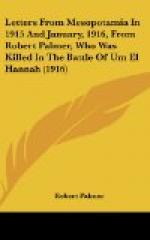I agree with most of your reflections about the moral justification of war. War is an evil, because it is the product of sin and involves more sin and much suffering. But that does not mean it is necessarily wrong to fight. Once evil is at work, one of its chief results is to leave good people only a choice of evils, wherein the lesser evil becomes a duty. I’m not prepared to say we’ve been wholly guiltless in the whole series of events which produced this war: but in the situation of July, 1914, produced as it was by various sinful acts, I am quite sure it was our duty to fight, and that it is our duty to fight on till German militarism is crushed. And I certainly can’t believe we ought not to have made such a treaty with Belgium as we did. You’ve got to face the fact that the spirit which produces war is still dominant. Fight that spirit by all means: but while it exists don’t suppose your own duty is merely to keep out of wars. That seems to me a very selfish and narrow view. As for our Lord in a bayonet charge, one doesn’t easily imagine it: but that is because it is inconsistent with His mission, rather than His character. I can’t imagine a Christian enjoying either a bayonet charge, or hanging a criminal, or overthrowing the tables of a money-changer, or any other form of violent retribution.
Your sight of the Zeppelin must have been thrilling. You don’t make it clear whether it was by day or night. I am curious to see if my next batch of Times will mention it. Clearly it is very hard to damage Zs. by gun-fire: but I don’t understand quite why our aeroplanes can’t do more against them. Do they get right back to Germany before daylight?
I have been out shooting three times this week, with Patmore of 1/7th Hants, and we got three partridges, six partridges and seven doves respectively. The partridges are big black ones, as large as young grouse, and very good to eat: but they will soon be extinct here as we are operating much in the same way as “the officers” do at Blackmoor. The doves were reported as sand-grouse, and certainly come flighting in from the desert very much in the s.-g. manner: but they are very like turtle doves when shot.
On our way home after the first shoot, I saw a falcon catch a swallow on the wing. It had missed one and we were watching it. It flew straight and rather fast past us, just within shot, fairly high. A swallow came sailing at full speed from the opposite direction and would have passed above and to the right of the falcon, and about 6ft. from it. The latter took no notice of it till the crucial moment, when it swerved and darted upwards, exactly as a swallow itself does after flies, and caught the swallow neatly in its talons. It then proceeded on its way so calmly that if you had taken your eye off it for 1/5th second you wouldn’t have known it had deviated from its course. It then planed down and settled about 400 yards away on the ground.




